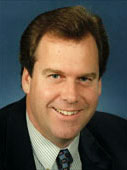 |

|
Terrorist Organisations, AC Nielsen Poll
Robert McClelland - Shadow Minister for Homeland Security,
|
Doorstop Interview
Transcript - Parliament House, Canberra - 3 March 2004
MCCLELLAND: I wanted to come out here and say a few things about the proscription bill that is going to be before the Senate today. Labor will support passage of that Bill with amendments agreed to by the Government, suggested by Labor. The amendments introduce what we think are appropriate safeguards that involve consultation, consideration by a committee, and ultimately Parliament having the ultimate say with the power of disallowance of any proscribing regulation.
REPORTER: Have you backflipped on this?
MCCLELLAND: No we haven't. We've worked very hard to get the safeguards up that we've required. As I say, those safeguards involve consultation with not only the Leader of the Opposition, but also State and Territory Leaders, the procedure for the joint standing committee on security matters that's considered the Weapons of Mass Destruction to examine the reasons for the decision, then for Parliament to have an extended period of disallowance to consider that report, and also for organisations to apply for delisting if they were of the view that they had been incorrectly named.
REPORTER: Philip Ruddock says you're backing down because this is an election year; you want to clear it before the election?
MCCLELLAND: Well the reality is that we're in agreement on this matter. The Government, Philip Ruddock, has picked up the proposals we've put forward. Anyone looking at them would say that they're sensible proposals. We've got to acknowledge, as Mark Latham has said, security should be above party politics. We've firmly taken that view. Our role, we believe, has been successful in getting safeguards that make our legislation far more sophisticated than any comparable legislation anywhere in the world.
REPORTER: Are you confident that these safeguards are enough to ensure that nobody will be unfairly treated under these laws?
MCCLELLAND: Yes we are. The fact that consultation must be across all political parties avoids the risk of the executive acting in its own political interests, the fact that the decision can be reviewed by this highly specialised committee, and the fact that ultimately Parliament, representing the people of Australia, can disallow any proscribing regulation are very significant safeguards.
REPORTER: Why did you decide to drop the requirement that terrorist organisations be listed with the UN before it can be done here?
MCCLELLAND: Well the difficulties with the UN procedure are that the focus of the UN resolution is on al Qaeda-linked organisations. So we've seen since then that restriction requiring Parliament to have specialist legislation in respect to for instance, Hamas, Hizballah and the Lashkar-e-Tayyiba organisation. We were of the view that the parliamentary disallowance process in itself was unsatisfactory. Why? Because there was no obligation of consultation, there was no committee review process, and essentially members and senators were required to act on hearsay – in other words, they didn't have the benefit of an expert committee advising them whether the decision was justified on its merits or not. So in summary, the mechanisms that we have in place are far safer than those previous mechanisms.
REPORTER: Why will the Government's use of intelligence to ban organisations be more trustworthy than its use of intelligence to go to war?
MCCLELLAND: That's a really excellent point – the fact that intelligence, either in its emphasis or its omissions, can be wrong means that you need this review procedure. So this is why we've stressed as probably the most significant element, in this case, review by the Joint Intelligence Committee that has a track record of being sophisticated in relation to these matters.
REPORTER: But that committee won't get full access to the intelligence, will it?
MCCLELLAND: That's always been the case and would be the case in respect to any court proceedings. But they'll have the opportunity of interrogating those primary officers who have recommended the proscription. They'll test them and be able prise them in an expert way how they have gone about these things as to the justification for their recommendations.
REPORTER: So how long will it take to ban an organisation now?
MCCLELLAND: It could be done instantaneously subject to appropriate consultation occurring with the Leader of the Opposition and the States. If there was an urgent situation it could be done very expeditiously, very quickly.
REPORTER: Are you expecting it to be used soon?
MCCLELLAND: We have no advice that it's intended to be used soon, and I have to say in fairness to our security agencies they're pretty diligent in informing the Opposition of impending issues.
REPORTER: Is this consultation with the State Leaders and the Opposition Leader just symbolism, because can't the Attorney-General simply disallow a group anyway?
MCCLELLAND: No it can't, and the ultimate control over whether there has been adequate consultation rests with the Parliament. If the Parliament is of the view that the consultation process has been inadequate, they have the power to disallow. That's the ultimate safeguard underpinning all these procedures. The fact of consultation is very significant. If you recall, what is controversial still within all sides of politics, the proposed listing of the Communist Party in the 1950s. The concerns were that the executive, the Attorney-General, could exercise that power for domestic political reasons. It's very important to have these consultation obligations to avoid any perception that the executive is misusing these powers for its own political purposes.
REPORTER: Are you comforted by today's AC Nielsen poll?
MCCLELLAND: Yes it's very encouraging. We of course have got to keep up the work. But clearly the people are responding to a positive message, a positive agenda, and interestingly the Government has turned into the situation where they're acting as an Opposition, attacking our positive initiatives …
Ends. E & OE - PROOF ONLY
|

